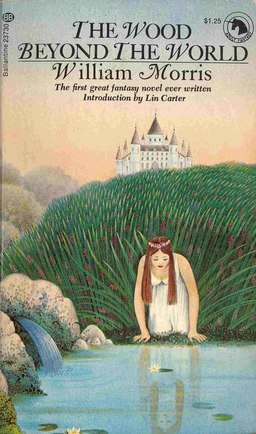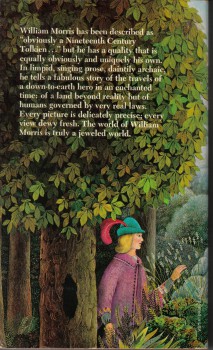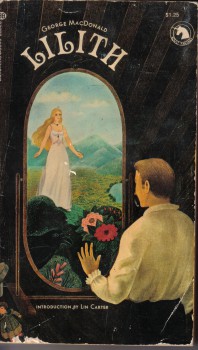The Ballantine Adult Fantasy Series: The Wood Beyond the World by William Morris
 The Wood Beyond the World
The Wood Beyond the World
William Morris
Ballantine Books (237 pages, June 1969, $0.95)
Cover art by Gervasio Gallardo
With this installment in my reviews of the Ballantine Adult Fantasy series, we come to the first volume by a man who has one of the worst reputations for prose in the series.
I’m talking of course about William Morris. Lin Carter published four of Morris’s works in five volumes; The Well at the World’s End came in at two volumes. Carter appears to have had plans for another four volumes.
In his introduction, Carter makes the claim that Morris invented the modern quest fantasy. Personally, I think that may be stretching things a bit. Morris did invent a number of things, including the Morris chair, but I’m not sure he should get sole credit for modern fantasy.
I must admit I came to this book with some trepidation. After the Adult Fantasy line was canceled, the Newcastle Forgotten Fantasy Library published 24 volumes, with five by Morris. I attempted to read one, the collection Golden Wings and Other Stories, about ten or twelve years ago. I didn’t get very far.
Fortunately, The Wood Beyond the World isn’t a long book. Furthermore, it’s broken up into short chapters, with a line break and a heading before every paragraph or two. Of course with Morris, paragraphs can be more than a page long.

The Wood Beyond the World tells the story of Golden Walter, son of a prominent merchant who has made an unfortunate marriage. His wife isn’t exactly a prize catch. After being cuckolded, he escapes his troubles (and potential trouble with her family) by sailing away on one of his father’s ships to visit a foreign port and enjoy life there for a while.
Before he leaves, he sees a cold-visaged but beautiful woman accompanied by a hideous Dwarf and a young maiden who is clearly in the power of the other two. It’s these three, Lady, Monster, and Maiden, who will become the central figures in Walter’s life.
While away, Walter receives word that his father has died in a conflict with his wife’s family and he needs to return home. But the ship is blown off course by a terrible storm. He and the crew find themselves on an unknown shore. While the crew repairs the damage, Walter strikes up a friendship with an old man who lives on the shore. During their conversations, Walter inquires of a pass he sees through a nearby cliff. He’s warned to stay away from it. Convinced the old man knows more than he’s telling, Walter slips off and explores the pass.
After a couple of days, he encounters the Dwarf, who gives him some food. Later he comes to a valley where he sees the Maid. She tells him she’s a prisoner of the Lady, and that the Lady’s magic has brought Walter there. The Lady had previously ensorcelled a king’s son, but she’s growing tired of him and wants Walter for his replacement. It’s not long before Walter and the Maid are professing their undying love for each other. The Maid also refuses to let Walter touch her because the Lady will know and punish her.
Walter continues on until he comes to the Lady’s castle. At first, she treats Walter with disdain, although she allows him to lodge there. But shortly, she begins to show more interest in him and less interest in the king’s son.

Much of the book from this point on involves the intrigues and manipulations of the Lady and how Walter and the Maid escape. After they escape, the Maid becomes a goddess to a tribe of vicious hillmen. Walter ends up as king of a small city and naturally makes the Maid his queen.
Morris’s wife was unfaithful to him and eventually left him. I have to wonder how much the unfaithfulness of Walter’s wife towards him, and at one point Walter’s unfaithfulness to the Maid, were Morris using his writing as therapy. I’ll leave that for scholars more knowledgeable about Morris than me.
There were times, mostly early on, that I wished I had a Cliff’s Notes version of the book, but then I realized that this book actually is a Cliff’s Notes version of what would be a longer book if it were written today. Morris’s style, while often overly descriptive, can also be pretty thin at times.
Here’s a sample, in which Walter and the Lady are hunting in the forest and come upon a threatening creature:
He had gone but a little way ere he saw the Lady standing there in a narrow clearing, her face pale as death, her knees cleaving together, her body swaying and tottering, her hands hanging down, and the bow and arrow fallen to the ground; and ten yards before her a great -headed yellow creature crouching flat to the earth and slowly drawing nigher. He stopped short; one arrow was already notched to the string, and another hung loose in the lesser fingers of his string-hand. He raised his right hand, and drew and loosed in a twinkling; the shaft flew close to the Lady’s side, and straightway all the wood rung with a huge roar, as the yellow lion turned about to bite at the shaft which had sunk deep into him behind the shoulder, as if a bolt out of the heavens had smitten him.
Whew. That was only three sentences. A more contemporary writer would have used more sentences, only a contemporary writer would have broken them up and put in more sensory detail, probably in several small paragraphs.
After a while, I found that the prose wasn’t as bad as I thought it would be. There is a rhythm to the way Morris wrote, but it takes a while to get into it. I’m not sure I want to make the effort.
 Everything in this book, and from what I understand the rest of his writing, is full of a sense of sweetness and light. L. Sprague de Camp certainly argues that point in his chapter on Morris in Literary Swordsmen and Sorcerers. This tendency makes things hard to swallow at times. For example, Walter and the Lady have sex at one point, at least I think they do, but the prose is so saccharine-y and euphemistic, it’s hard to be completely certain.
Everything in this book, and from what I understand the rest of his writing, is full of a sense of sweetness and light. L. Sprague de Camp certainly argues that point in his chapter on Morris in Literary Swordsmen and Sorcerers. This tendency makes things hard to swallow at times. For example, Walter and the Lady have sex at one point, at least I think they do, but the prose is so saccharine-y and euphemistic, it’s hard to be completely certain.
I stated when I started this series that I would read at least one book by the authors who had multiple volumes in the Adult Fantasy line. If I liked their work, I would read others; if not, I would limit myself to that book. Morris is probably going to be a one book author. The only other one that sounds interesting, and possibly worth the effort, is The Well at the World’s End.
The other thing I said was that while I would start reading the books in order of their publication, I might from time to time jump around. At this point, I’m going to switch the order of the next two books. The next volume in the Adult Fantasy line is The Silver Stallion by James Branch Cabell. I’m going to skip to Lilith by George MacDonald.
I have a full set and a number of reading copies. I don’t have a reading copy of The Silver Stallion and the copy I have isn’t in the best of shape. The reading copy I ordered turned out not to be the Adult Fantasy edition. That matters because the Adult Fantasy edition has illustrations, and the reading copy I ordered doesn’t. So I’ll be looking at Lilith until I get a second Adult Fantasy edition of The Silver Stallion.
The previous installments in this series are:
Lin Carter and the Ballantine Adult Fantasy Series
The Ballantine Adult Fantasy Series: The Blue Star by Fletcher Pratt
The Ballantine Adult Fantasy Series: The King of Elfland’s Daughter by Lord Dunsany
Here’s what I wrote recently about this book, mostly for my own reference:
I read The Wood Beyond the World over the past couple of days, so here are some thoughts about it — which people who mean to read it soon might want to skip till they’ve read it (or skip entirely!). 7 Feb 2012
1.You could say that the organizing principle of the story is Difficulties With Girls — well, two women and one girl.
[a]There’s the subject of what Morris (who has no sense of the Christian sacraments so far as I know, let alone a sense of marriage as having a spiritual as distinct from psychological and physical element) would regard as conventional marriage. Walter married a beautiful woman but she became emotionally and physically unfaithful to him. Apparently in Morris’s “medieval” fantasy world (more about this in #2 below), there’s no ecclesiastical or civil recourse for the innocent party in a broken marriage. Walter leaves.
[b] There’s the subject of sexuality and power. The Lady of the Wood Beyond the World uses her apparently timeless sexual allure to dominate a series of lovers or to try to, Walter being the third.
[c] There’s the subject of Morris’s ideal of sexual relations, which appears to be that the lovers are friends who find the other person a happy sexual partner. Marriage as ecclesiastical or civil ceremony appears to exist in the city in which Walter and the Maid (she has no name; when they’ve consummated their relationship, she becomes the Queen), but Morris presents it in an absolutely minimal way. His focus is on the freely-chosen union of two equals; so far as one can tell, they did not make “conventional” marital vows.
Walter has to trust the Maid, and she urges him to prove trustworthy. She works out their deliverance to a much greater degree than he does; Walter typically reacts rather than acts. I think this works well for the story’s literary purposes. It lets us identify with Walter as a mortal wanderer into what Tolkien calls Faerie. Tolkien said that the wanderer in Faerie must be alert and not ask too many questions. (See the second paragraph of “On Fairy-Stories.”)
2.Morris is credited by Lin Carter with creating the imaginary world fantasy. I’m not sure how he defines “imaginary world.” Clearly Morris means the story to occur in some version of medieval Europe, since he refers to “Christendom,” etc. On the other hand there are no references to political units such as, e.g., Franks, English, etc. (There is a reference to Saracens, the people of Mahound or Mawmet.) There are absolutely no references to historical kings or popes.
3.The explicitly fantastic element is used effectively; Morris does not pile on wonders for their own sake. The Wood Beyond the World is a place, like Dunsany’s Faerie in “The Kith of the Elf-folk” as I recall, or as in Tolkien’s Smith of Wootton Major (a story that has some affinities with Morris’s Wood) that you can get to simply by walking there. In the Wood, Walter encounters illusions (the “lion”) and a goblin/dwarf, who is not “explained” but simply seems to come with the territory. The Maid appears to command an art greater than that of the Lady, in that the Maid actually does revive the flowers she wears, and (apparently) causes rain to come to the parched Bear-folk. However, she is not the goddess that they take her to be.
4.The mildly archaic style is easy to read. The only word I looked up was his use of bent, which I take to refer to a curved topographical form. The style is integral to the faerie-quality of the story.
I’d read this story twice before, both times in the Seventies, and I think I may have enjoyed it the most this time.
Here are some notes that might be of interest to people who want to join you for MacDonald’s Lilith!
http://www.george-macdonald.com/resources/lilith_study_guide.html
I think Morris’ prose isn’t particularly easy, but he was very successful at what he set out to do in terms of creating a faux-archaic style that was still understandable to modern readers. For my money (as I’ve said before), Hodgson’s Night Land is worse in terms of prose (although I much prefer the Hodgson’s story & setting) and George Meredith’s Shaving of Shagpat is the bottom of the barrel.
I first encountered Morris in A Treasury of Fantasy — https://www.goodreads.com/book/show/413262.A_Treasury_of_Fantasy. That book was also my first introduction to George MacDonald.
Given your reaction, I’m not sure if I’d recommend proceeding with Well at the World’s End. It’s actually pretty similar, story-wise and has all the weaknesses (and strengths) of its predecessor.
Good analysis, Major. Some thoughts:
I agree that relationships, and particularly problems with the opposite sex, make up a large theme of the book. Morris was not without his troubles in this area, so this theme isn’t surprising.
Marriage here does seem to be lacking the spiritual element. But then I didn’t get the sense that there was really much about the book that was spiritual. All of the fantastic elements could be taken as exotic aspects of the natural world. The dwarf, the magic powers of the women, etc.
As to sexuality and power, I would say the Maid has more power over Walter than the Lady since the Maid withholds herself from him until he has done her bidding. The Lady does as well, but only for a period of time. While Walter follows both of their instructions, it’s ultimately the Maid he obeys.
And the Maid stays sexually faithful to Walter even when he isn’t faithful to her.
You raise a good point about the Maid working out their deliverance more than Walter. She is the one who plans their escape and kills the Lady in the end. Walter almost seems like a chess piece in a power struggle between the women.
Morris was very much a Medievalist who wanted to return to an idealize version of the Middle Ages. I’m not sure that is incompatible with imaginary world fantasy since the version of the Middle Ages Morris prefers is demonstrably imaginary.
I find Morris not referencing political units an interesting contrast to Dunsany, who did from time to time break out of the story in The King of Elfland’s Daughter to tie the story into actual history. To me, Dunsany’s approach, while jarring to a contemporary reader, made the story believable.
I agree that Morris used the fantastic effectively by being restrained in how he applied it to the story. While not giving a basis for the magic used by the Lady and the Maid, he retained an aura of mystery.
The style wasn’t as difficult as I was expecting it to be. And, you’re right, it did fit the faerie-quality of the story well.
And thanks for the link. I’ll check it out. I’m going to start Lilith in about a week or so, once I clear some other titles.
Joe, I remember you mentioning The Shaving of Shagpat. That one does look daunting. I’ve not read The Night Land, but I’ve heard some things about it that make me think it won’t be a light read.
I may still try The Well at the World’s End. Once I got into the rhythm of Morris’s prose, it wasn’t too bad. The hardest thing about it was it required more concentration than I’m capable of giving late at night, which given some time constraints is often when I have time to read.
I have the Treasury of Fantasy but haven’t read it. I do remember it has a MacDonald story in it as well.
The MacDonald story in Treasury of Fantasy was Phantastes, which was also included in the BAF.
And I know exactly what you mean about Morris requiring concentration — I think my pages per hour on Morris was about half that of the stuff I usually read. But it was ultimately rewarding once I got into the right mindset.
Yes, it was Phantastes. I remember being puzzled by the name (I was around 12 at the time.) If I enjoy Lilith, I’ll include Phantastes in this series.
I can’t recommend “The Well at the World’s End.” I found it plodding and wearisome. You might try “The House of the Wolfings” for something more red-blooded. Of course that’s pretty slow going as well. I ultimately found myself rooting for Morris’ villains. Perhaps I ought to admit that his work just isn’t for me. On a brighter note, I think you’ll get a kick out of “The Silver Stallion.” When I read it as a kid it became my James Branch Cabell gateway drug.
The Well at the World’s End sat on my shelf for many years, daring me to give it a go. I finally took the plunge last year – and enjoyed it very much. It’s very consciously symbolic – it essentially enacts the biblical story of The Fall in reverse, and has some of the biblical story’s mythic weight. It’s certainly not in any great hurry to get anywhere, and I think it will work best for readers who aren’t in a hurry themselves.
And Ken, it’s funny that you would love Cabell but find Morris plodding and wearisome – I was wearied by the constant wink-wink-nudge-nudge puns in Jurgen more than by anything in The Well! (Though I did like Jurgen overall). Different strokes…
Different strokes indeed, as you rightly state, emcgargle. Jurgen I’ve read multiple times – I keep going back to The Well, so to speak.
Given the broad differences in opinion, I’m going to have to read The Well at the World’s End just to see which opinion I most agree with.
And given that Cabell seems to be eliciting as much variety in opinion, I may reconsider reading Lilith first. Provided I can find a BAF edition reading copy.
[…] interested, my latest post in the Ballantine Adult Fantasy series at Black Gate went live today. It’s about The Wood Beyond the World by William Morris. Even though the post has only been up a few hours, it’s generated some […]
If you’re not wedded to the original BAF cover (and it is indeed a fine cover), I think the Del Rey reprint of Silver Stallion from 1979 was identical to the BAF edition, including the Carter introduction, and is easier to lay hands on.
Thanks, Joe. I thought that might be the case. I’m not wedded to the cover; I just want the illustrations in whatever edition I read since they were in the BAF edition and are subject to comment.
“A more contemporary writer would have used more sentences, only a contemporary writer would have broken them up and put in more sensory detail, probably in several small paragraphs.” True – but it helped me to think of Morris as a tapestry rather than as a movie. Compared to today’s writing, it’s two-dimensional, but the pleasure comes from observing the formalistic patterns and arrangements of the plot and characters. If that’s not the sort of thing you appreciate, or can bring yourself to appreciate, you’re just not going to like Morris.
[…] editing. His most prestigious work was the creation of the Ballantine Adult Fantasy Series (being reviewed one volume at a time here on Black Gate by Keith West). It resurrected many of the forebears of […]
Just finished this book. About three pages into the beginning, I thought I wouldn’t be able to handle the style of writing. But, after awhile, I kind of fell into the melody and flow of the language. I also was fairly drawn in by the story until the main character got to the wood beyond the world. From there it struck as something of Alice In Wonderland tale where nothing really operates in any sort of coherent way. I could never tell–even to the very end–when the main character was being yanked by his tie or whether he was actually in control of his actions. For the most part, things just seemed to happen to the main character.
A bit strange, but I’m willing to try and read another Morris work sometime in the near future.
[…] Morris is best remembered today as a pioneer in textiles and wallpaper patterns, but he was also an accomplished writer. Lin Carter reprinted four of his novels in the Ballantine Adult Fantasy series in the late 1960s and early 1970s. I reviewed The Wood Beyond the World a few years ago at Black Gate. […]
[…] justification for that, I think it’s largely undeserved. I’ve read one of his novels, The Wood Beyond the World, which I reviewed some years ago at Black Gate, when I was reading through the Ballantine Adult […]